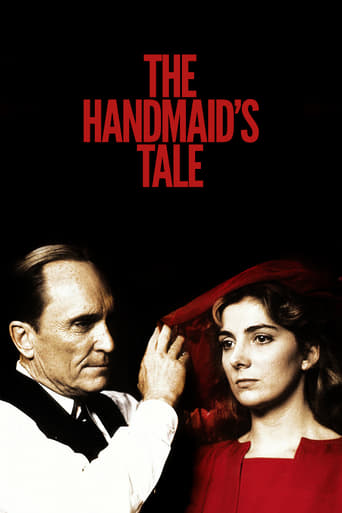

This movie made me dig up my old IMDb account I never planned on reviving, that's how bad I find it to be although feel free to ignore my post because I liked the book better so I might be a little biased here. Those who didn't read the book might find this movie tolerable.The top reason I dislike this movie is because it utterly disregards the last meta-fictional part of the book which was so crucial to the story written by Margaret Atwood. The entire narration is actually a lost diary of your very average person who is no writer but finds herself suddenly trapped in the cogs of theocratic totalitarianism and still manages to "record" her thoughts on tapes and paper (what you read) to preserve her sanity just like Winston Smith from Nineteen Eighty-Four did which later is found and used as a retrospective account of a "bygone world" in a free civilization that studies barbaric aspects of its history, giving it a rather optimistic ending which was absent in the movie or just replaced with a watered-down Hollywoodish "I'll find you, baby. Oh look, it's the auspicious sunset *faces the sunset while smiling*" ending (living as an "unwoman" in a trailer park, is that Volker Schlöndorff's idea how to end this movie?).Handmaid's Tale without its proper context as a historic "document" is just pointless. Film adaptations like this convince me that some books are simply impossible to be adapted either out of budget reasons or other and if you still go ahead and make it, you'll end up with a pointless Hollywood's assembly line flick that shares original work's name only and is nothing but an empty shell of it, filled with popcorn audience-appeasing violent filler.Two stars for costumes which were far more impressive than those I made up in my head and the "All-Seeing Eye" design which while not original (you can see it on every one dollar bill, the symbol of Christianity's Trinity) is still profound and in this hypothetical world probably as scary as a Nazi Germany's swastika.- - P.S. One would be really tempted to draw parallels with what's happening in the US in 2017 and the plot of Handmaid's Tale with Planned Parenthood being threatened to be defunded, abortion clinics all over the country threatened to lose federal funding unless they, um, stop performing abortions, evangelical-approved far-right "Family Groups," one of them designated as a "hate group" by the Southern Law Poverty Center, sent to the UN Women's Rights Conference (2017) as representatives of US women's interest (I wish this was satire) and while the President was not shot yet and replaced with federal theocratic dictators that systematically tread on the rights of women I think that's all it is, a tempting suggestion. I wouldn't be so far from right if I called it a "cautionary tale" though.(2018 update: Flick is hardly worth even one star, let's be honest now.)
... View MoreThe reason why I got to watch this because the late Natasha Richardson was involved in this. However the storyline with her becoming a slave for no apparent reason.Like why was her character arrested and become a slave for no apparent reason? Also why was the husband shot and the young daughter wandering around to find her parents?I mean I tried to remain interested when watching this movie because I wanted to find out what was happening. In the end, I just had to move onto another movie in which I would be able to understand better and clearer than this!!!
... View MoreIn a world consumed by infertility, Kate (Natasha Richardson) is trying to escape the Republic of Gilead with her family. It's a totalitarian Christian state where fertile women are forced to conceive. The blacks, welfare, women's liberation and in vitro fertilization are among the things blamed for the world's problems. Kate and her daughter are captured while her husband is killed. Kate is made to be a handmaid trained by Aunt Lydia (Victoria Tennant). She befriends lesbian Moira (Elizabeth McGovern). She is placed with the commander (Robert Duvall) and given the new name Offred. She is ritualistically raped and expected to conceive for them. As he takes an interest in her, she fears retribution from his wife Serena Joy (Faye Dunaway). The commander is infertile and she falls for the help Nick (Aidan Quinn).It's a harrowing world. The problem is trying to get a compelling story out of it. It's fine for the most part although the production design could be better. The last act needs an explosive ending. The movie decides on an actual explosion which does nothing for the tension. With its obvious restraints, the movie needs a less expensive and more intense final conflict. In my mind, she needs to also kill Serena Joy in an all out fight. Kate ends up waiting around for the men to save the world. It's not a terribly liberated ending.
... View MoreMargaret Atwood's acclaimed novel, adapted for the screen and turned into a high-minded but posed, uncomfortable human drama, despite an expert cast. Taking place in the soulless distant future, all young women have been turned into child-breeders for wealthy, infertile couples, with Nastasha Richardson assigned to nightmarish twosome Robert Duvall and Faye Dunaway. Elizabeth McGovern plays a lesbian who hopes to make a break for it (every totalitarian society should have one). Certainly watchable, though an icy cold presentation which promises to be much more than it is. Richardson doesn't flash a hint of her feisty personality, though McGovern is very good and Duvall does what he can with a terrible role. ** from ****
... View More